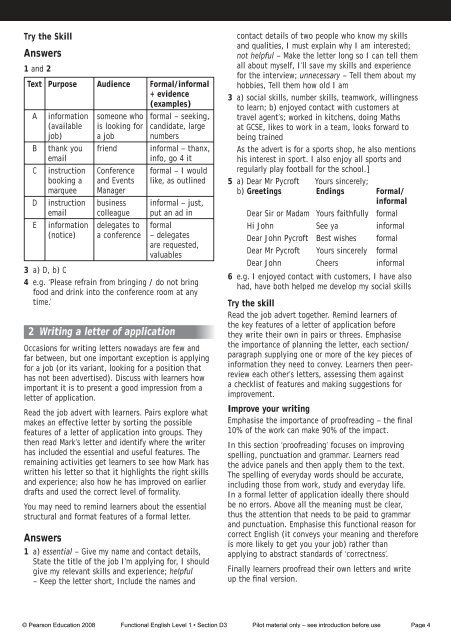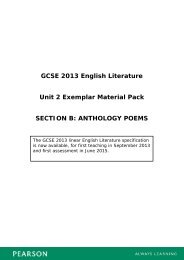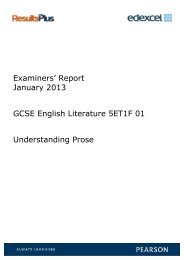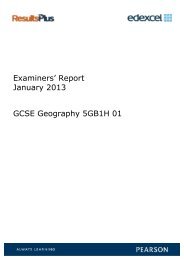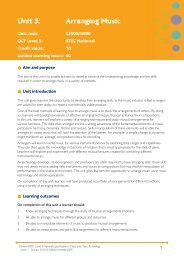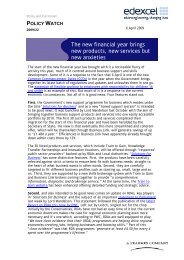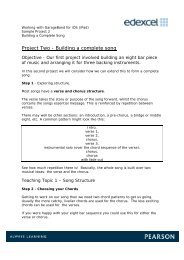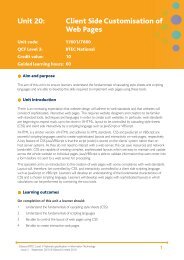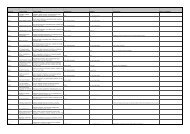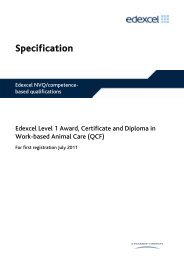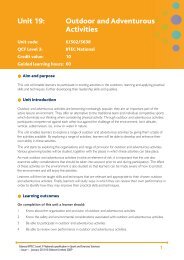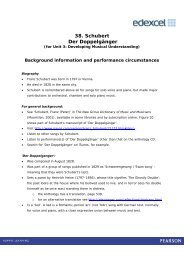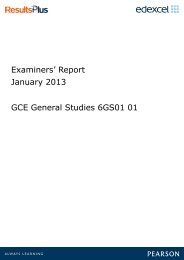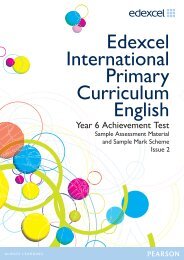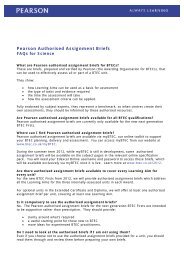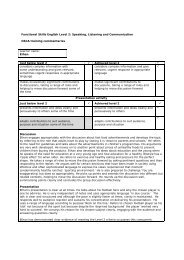English Level 1 - Edexcel
English Level 1 - Edexcel
English Level 1 - Edexcel
You also want an ePaper? Increase the reach of your titles
YUMPU automatically turns print PDFs into web optimized ePapers that Google loves.
Try the Skill<br />
Answers<br />
1 and 2<br />
Text Purpose Audience Formal/informal<br />
+ evidence<br />
(examples)<br />
A information<br />
(available<br />
job)<br />
B thank you<br />
email<br />
C instruction<br />
booking a<br />
marquee<br />
D instruction<br />
email<br />
E information<br />
(notice)<br />
someone who<br />
is looking for<br />
a job<br />
formal – seeking,<br />
candidate, large<br />
numbers<br />
friend informal – thanx,<br />
info, go 4 it<br />
Conference<br />
and Events<br />
Manager<br />
business<br />
colleague<br />
delegates to<br />
a conference<br />
formal – I would<br />
like, as outlined<br />
informal – just,<br />
put an ad in<br />
formal<br />
– delegates<br />
are requested,<br />
valuables<br />
3 a) D, b) C<br />
4 e.g. ‘Please refrain from bringing / do not bring<br />
food and drink into the conference room at any<br />
time.’<br />
2 Writing a letter of application<br />
Occasions for writing letters nowadays are few and<br />
far between, but one important exception is applying<br />
for a job (or its variant, looking for a position that<br />
has not been advertised). Discuss with learners how<br />
important it is to present a good impression from a<br />
letter of application.<br />
Read the job advert with learners. Pairs explore what<br />
makes an effective letter by sorting the possible<br />
features of a letter of application into groups. They<br />
then read Mark’s letter and identify where the writer<br />
has included the essential and useful features. The<br />
remaining activities get learners to see how Mark has<br />
written his letter so that it highlights the right skills<br />
and experience; also how he has improved on earlier<br />
drafts and used the correct level of formality.<br />
You may need to remind learners about the essential<br />
structural and format features of a formal letter.<br />
Answers<br />
1 a) essential – Give my name and contact details,<br />
State the title of the job I’m applying for, I should<br />
give my relevant skills and experience; helpful<br />
– Keep the letter short, Include the names and<br />
contact details of two people who know my skills<br />
and qualities, I must explain why I am interested;<br />
not helpful – Make the letter long so I can tell them<br />
all about myself, I’ll save my skills and experience<br />
for the interview; unnecessary – Tell them about my<br />
hobbies, Tell them how old I am<br />
3 a) social skills, number skills, teamwork, willingness<br />
to learn; b) enjoyed contact with customers at<br />
travel agent’s; worked in kitchens, doing Maths<br />
at GCSE, likes to work in a team, looks forward to<br />
being trained<br />
As the advert is for a sports shop, he also mentions<br />
his interest in sport. I also enjoy all sports and<br />
regularly play football for the school.]<br />
5 a) Dear Mr Pycroft Yours sincerely;<br />
b) Greetings Endings Formal/<br />
informal<br />
Dear Sir or Madam Yours faithfully formal<br />
Hi John See ya informal<br />
Dear John Pycroft Best wishes formal<br />
Dear Mr Pycroft Yours sincerely formal<br />
Dear John Cheers informal<br />
6 e.g. I enjoyed contact with customers, I have also<br />
had, have both helped me develop my social skills<br />
Try the skill<br />
Read the job advert together. Remind learners of<br />
the key features of a letter of application before<br />
they write their own in pairs or threes. Emphasise<br />
the importance of planning the letter, each section/<br />
paragraph supplying one or more of the key pieces of<br />
information they need to convey. Learners then peerreview<br />
each other’s letters, assessing them against<br />
a checklist of features and making suggestions for<br />
improvement.<br />
Improve your writing<br />
Emphasise the importance of proofreading – the fi nal<br />
10% of the work can make 90% of the impact.<br />
In this section ‘proofreading’ focuses on improving<br />
spelling, punctuation and grammar. Learners read<br />
the advice panels and then apply them to the text.<br />
The spelling of everyday words should be accurate,<br />
including those from work, study and everyday life.<br />
In a formal letter of application ideally there should<br />
be no errors. Above all the meaning must be clear,<br />
thus the attention that needs to be paid to grammar<br />
and punctuation. Emphasise this functional reason for<br />
correct <strong>English</strong> (it conveys your meaning and therefore<br />
is more likely to get you your job) rather than<br />
applying to abstract standards of ‘correctness’.<br />
Finally learners proofread their own letters and write<br />
up the fi nal version.<br />
© Pearson Education 2008 Functional <strong>English</strong> <strong>Level</strong> 1 • Section D3 Pilot material only – see introduction before use Page 4


